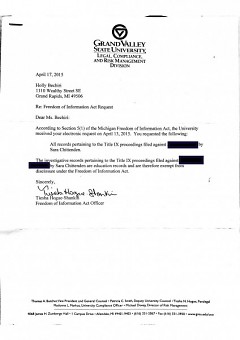[Trigger warning: This article contains a story of rape.]
Investigations into Grand Valley State University (GVSU)’s alleged mishandling of Title IX procedures have lead to the Department of Education just recently informing Sara Chittenden that she can now publicly talk about her own experiences dealing with a Title IX case at GVSU. Though the story starts nearly three years ago, Chittenden says she still feels the effects today, and wants to share her story with her community. Her story is incomplete, though, as GVSU has denied a FOIA request to The Rapidian, stating that the trial is an "education record" and therefore exempt from FOIA requirements. This means that though Sara can share her own name as the victim, she cannot state the rapist's name as the perpetrator.
In June 2012, a male [name witheld] Grand Valley State University (GVSU) student -and a self-proclaimed feminist- raped Chittenden. A man who one would think fully understood the concept of consent was found guilty of rape “violating Section 206.02: Sexual Assault” by GVSU’s Conduct Board.
In his off-campus student apartment in Copper Beech, he raped her in his bedroom.
Nearly a year later in May 2013, the night before leaving the country to study abroad in Japan, Chittenden opened the door for a pizza delivery to discover the man holding her pizza was the one who had raped her the year before. He now knew the address to her parent’s house. Chittenden flew to Japan, completed her studies, and returned ready to try to hold the assaulter legally accountable for what he did to her. Her research provided two possible options for how to do this: go to the police, or file a Title IX complaint at GVSU.
On August 4, 2013, she decided to file a Title IX complaint, and spoke with Theresa Rowland, then the Victim Advocate at the Women’s Center and now the Title IX Coordinator, to find out how to start the procedure. On August 28, she was informed that the investigation was underway and that Dwight Hamilton, GVSU’s Associate Vice President for Affirmative Action and Title IX Officer at that time, submitted the request himself and said that it was being handled.
Per GVSU’s own guidelines, Title IX filings are to be completed within 60 days.
On January 31, 2014, 180 days after Chittenden’s first email, she received an email from Hamilton, informing her that a judicial referral had been filed with the Dean of Students Office against her assaulter.
Eight months after her first email, on April 1, 2014 she received an email from Hamilton, informing her that he had been found “responsible for violating Section 206.02 Sexual Assault” and had assigned the following sanctions:
1. [name removed] is prohibited from contacting you either directly or indirectly, through electronic media, phone, etc.
2. [name removed] is to remain on probation during the remainder of his student status.
3. [name removed] is required to meet with the coordinator of the Men in Action Group to discuss consent and the role of men in preventing sexual assault and sexual violence towards women; and
4. [name removed] must write a 3 page paper at the conclusion of the meeting with the coordinator of the Men in Action Group to confirm his understanding of his meeting with the Men in Action Group. This paper must be completed no later than April 21, 2014.
The hearing was over, he was found guilty, and sanctions were dealt- 240 days after Chittenden started the process to file a Title IX complaint.
He was found guilty. He was found guilty by GVSU, and though she was told that an appeal would be filed for more appropriate sanctions, she never again heard from either Hamilton or Rowland.
Ironically, a story about two girls plagiarizing a test and one of them being suspended appeared in the news the following month. These two students, found guilty of cheating on a test, were both put on probation and one of them was suspended for the fall 2013 semester.
Meanwhile, her assaulter was found guilty of a violent crime and his strongest sanction was the requirement to write a three page paper.
The most frequent response to Sara Chittenden's story is being told that she is strong, and that’s it. It is helpful, but also selfish in a way. It’s another instance of "showing support" but not caring enough to help beyond that. All it does is make her feel like she should be trying harder, and that ultimately she is the sole person responsible to bring about the justice she is seeking.
Only a handful of people have meaningfully supported her: other victims of rape who understand what she is going through and are offering their stories, empathy and their time. What does it mean about us as a society when the only people who care about rape are others who have been raped? This solidarity she has received from other victims has been beneficial, but from their dialogue, they still can’t relate to her because, on top of dealing with the rapist, she is still fighting with a West Michigan school that mistreated a victim of a brutal crime. She still feels pretty alone in this struggle.
[In full disclosure, I am dating Sara Chittenden, and she has asked me to help tell her story.]
More times than I can count I’ve heard her say that she doesn’t feel human. After going public on the news she even received a Facebook message from a man who said that he saw her on the news and was wondering if she was single. She dyed her hair back to brown to try to prevent anyone from recognizing her when she is out in public, and it seems to be working- but she shouldn't have to worry about that. We often talk about moving away just to be in a space where no one knows who we are and we don’t know who they are.
We aren’t taught in school how to be supportive to victims of sexual assault. We’re also much more comfortable talking about the national epidemic of rape on college campuses, but when it comes to helping a specific individual in our local community we’re stuck scratching our heads.
One out of every six women has been the victim of an attempted or completed rape in her lifetime. This means that everyone in our community personally knows someone who is dealing with this or has dealt with it.
Sara Chittenden says she doesn’t like being called a survivor. To her, she hasn’t survived through it yet. The truth is that she is still dealing with the aftermath every day. Sara Chittenden wants justice- appropriate justice, not a slap on the wrist- for her rapist and all others committing sexual assault on our campuses and in our communities. We should be helping her to fix our schools- and communities too.
Editor's note: This is part one of a story of one GVSU student's experiences with Title IX procedures and the lack of support felt by sexual assault victims despite the reality that one in six women experiences sexual assault in their lifetime.
We don't talk about how to support victims of sexual assault as a community- but we should. This series is intended to foster conversation about how victims of sexual assault and perpetrators of rape are treated in our community- and how we can do better.
Disclosure: The author is dating Sara Chittenden, and has -per her request and with her approval- offered to help tell her story.
The Rapidian, a program of the 501(c)3 nonprofit Community Media Center, relies on the community’s support to help cover the cost of training reporters and publishing content.
We need your help.
If each of our readers and content creators who values this community platform help support its creation and maintenance, The Rapidian can continue to educate and facilitate a conversation around issues for years to come.
Please support The Rapidian and make a contribution today.

